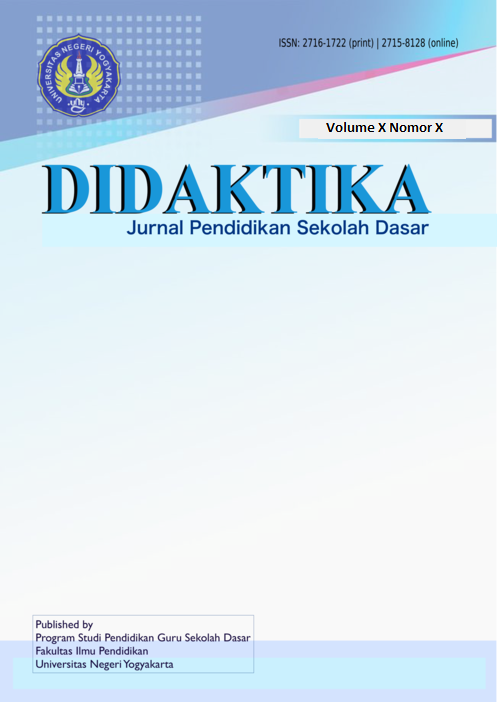Perkembangan Sikap Sosial Anak melalui Proses Apresiasi terhadap Tradisi Sambatan di Desa Dermolo, Jepara
DOI:
https://doi.org/10.21831/didaktika.v3i1.30932Abstract
This research aims to describe the Sambatan Tradition in DermoloVillage, the values of character education and influence on children's social behavior through an appreciation process. This research uses descriptive method with a phenomenological approach. The object of this research is the Sambatan Tradition in Dermolo Village, while the subject is the Dermolo Village community. The targets of this research are the Sambatan Traders, Dermolo Village community leaders, SDN 03 Dermolo principals, teachers and students. Data obtained through in-depth interview, observation, documentation and recording. There are two sources of data in this research, namely the Dermolo Village community who are directly involved with the Sambatan Tradition and education practitioners at SDN 03 Dermolo including students. Validity test uses source triangulation techniques. Data analysis techniques using data reduction, data presentation and conclusion or verification. The Sambatan Tradition with character education value has a great influence on the lives of the people of Dermolo Village and encourages the appreciation of children. Sustainability of the Sambatan Tradition with values of tolerance, social care and environmental care implied in it has an influence on children's development, especially social attitudes in daily life.
Keywords: Sambatan Tradition, appreciation, character, social attitudes of children
References
Bintari, P. N., & Darmawan, C. (2016). Peran Pemuda sebagai Penerus Tradisi Sambatan dalam Rangka Pembentukan Karakter Gotong Royong. Jurnal Pendidikan Ilmu Sosial, 25(1), 57-76.
Cohen, J. (2001). Defining identification: A theoretical look at the identification of audiences with media characters. Mass communication & society, 4 (3), 245-264.
Desmond, K.K. 2011. Ideas about Art. Garsington Road, U. K: Wiley Blackwell.
Gunarto. 2004. Konsep Kurikulum di Indonesia. Rosda Karya: Bandung
Hurlock, Elizabeth. 2003. Psikologi Perkembangan Suatu Pendekatan Sepanjang Rentang Kehidupan. Jakarta: Erlangga.
Jazuli. 2008. Paradigma Kontekstual Pendidikan Seni. Semarang: Unesa University Press.
Kemendiknas. 2011. Panduan Pelaksanaan Pendidikan Karakter. Badan Penelitian dan Pengembangan Pusat Kurikulum dan Perbukuan. Jakarta.
Koentjaraningrat. 2009. Pengantar Ilmu Antropologi. Jakarta: RinekaCipta.
Listyarti, Retno. 2012. Pendidikan Karakter dalam Metode Aktif, Inovatif dan Kreatif. Jakarta: Penerbit Erlangga.
Miles, M.B. & Huberman, A.M. (1992). Analisis data kualitatif (diterjemahkan oleh Tjetjep Rohendi Rohidi). Jakarta. UI Press.
Moleong, Lexy. 2010. Metode Penelitian Kualitatif. Jakarta: UI Press.
Nesdale, D., & Flesser, D. (2001). Social identity and the development of children's group attitudes. Child Development, 72(2), 506-517.
Payton, J. W., Wardlaw, D. M., Graczyk, P. A., Bloodworth, M. R., Tompsett, C. J., & Weissberg, R. P. (2000). Social and emotional learning: A framework for promoting mental health and reducing risk behavior in children and youth. Journal of school health, 70(5), 179-185.
Rondhi, Moh. 2002. "Tinjauan Seni Rupa 1" Buku Ajar. Semarang: Jurusan Seni Rupa Fakultas Bahasa dan Seni Universitas Negeri Semarang.
Sartono, Kus, E. Eddy. 2018. Pendidikan Nilai Kepedulian Sosial melalui Budaya Sekolah (Study Fenomenologi di SD Tumbuh 1 Yogjakarta). Jurnal Didaktika: Jurnal Pendidikan Sekolah Dasar, 1 (2), 43-50.
Schaefer, E. S. (1965). Children's reports of parental behavior: An inventory. Child development, 413-424.
Sugiyono. (2016). Metode Penelitian Kuantitatif, Kualitatif dan R&D. Bandung: Alfabeta.
Sulhan, Muhammad. (2018). Pendidikan Karakter Berbasis Budaya dalam Menghadapi Tantangan Global. Jurnal Visipena, 9 (1), 159-172.
Tylor, E.B., 1871, Primitive Culture, London; John Murray
Downloads
Published
How to Cite
Issue
Section
Citation Check
License
- Authors retain copyright and grant the journal right of first publication with the work simultaneously licensed under a Creative Commons Attribution License that allows others to share the work with an acknowledgement of the work's authorship and initial publication in this journal.
- Authors are able to enter into separate, additional contractual arrangements for the non-exclusive distribution of the journal's published version of the work (e.g., post it to an institutional repository or publish it in a book), with an acknowledgement of its initial publication in this journal.
- Authors are permitted and encouraged to post their work online (e.g., in institutional repositories or on their website) prior to and during the submission process, as it can lead to productive exchanges, as well as earlier and greater citation of published work.






